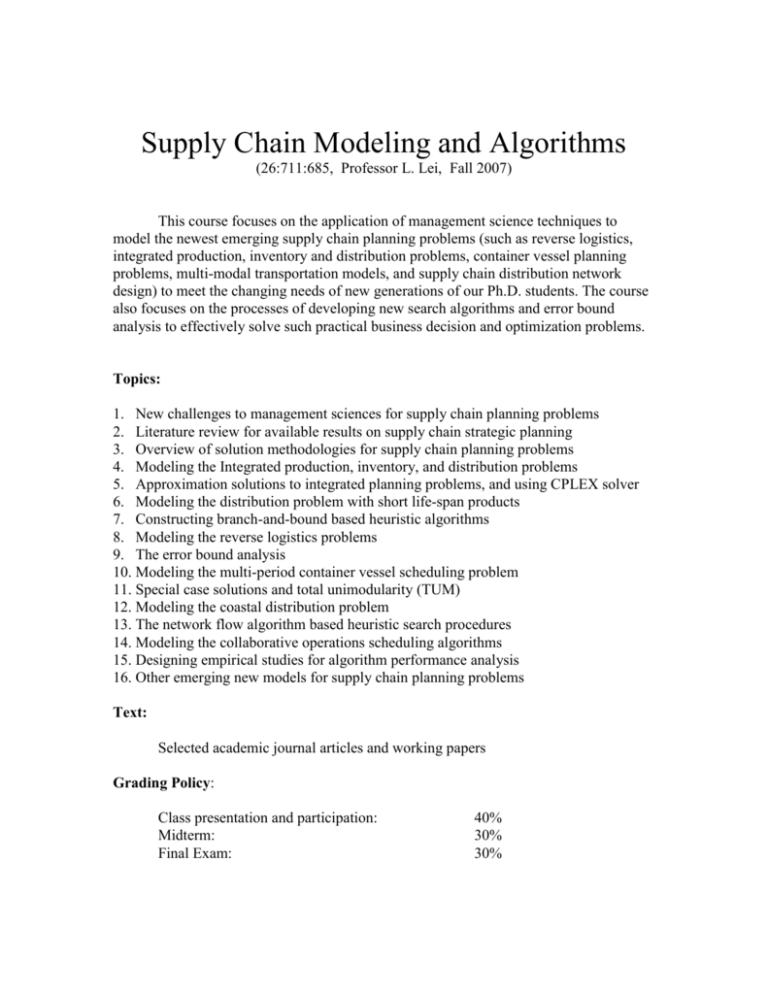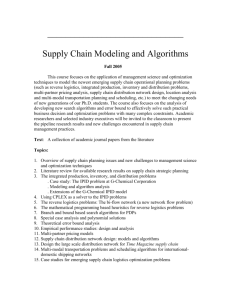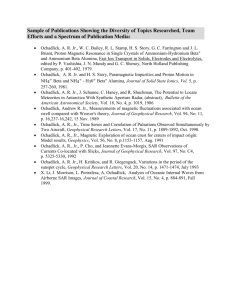Supply Chain Modeling and Algorithms
advertisement

Supply Chain Modeling and Algorithms (26:711:685, Professor L. Lei, Fall 2007) This course focuses on the application of management science techniques to model the newest emerging supply chain planning problems (such as reverse logistics, integrated production, inventory and distribution problems, container vessel planning problems, multi-modal transportation models, and supply chain distribution network design) to meet the changing needs of new generations of our Ph.D. students. The course also focuses on the processes of developing new search algorithms and error bound analysis to effectively solve such practical business decision and optimization problems. Topics: 1. New challenges to management sciences for supply chain planning problems 2. Literature review for available results on supply chain strategic planning 3. Overview of solution methodologies for supply chain planning problems 4. Modeling the Integrated production, inventory, and distribution problems 5. Approximation solutions to integrated planning problems, and using CPLEX solver 6. Modeling the distribution problem with short life-span products 7. Constructing branch-and-bound based heuristic algorithms 8. Modeling the reverse logistics problems 9. The error bound analysis 10. Modeling the multi-period container vessel scheduling problem 11. Special case solutions and total unimodularity (TUM) 12. Modeling the coastal distribution problem 13. The network flow algorithm based heuristic search procedures 14. Modeling the collaborative operations scheduling algorithms 15. Designing empirical studies for algorithm performance analysis 16. Other emerging new models for supply chain planning problems Text: Selected academic journal articles and working papers Grading Policy: Class presentation and participation: Midterm: Final Exam: 40% 30% 30% Supply Chain Modeling and Algorithms 26:711:685 Rutgers Business School, Fall 2007 Readings: Armstrong, R., S. Gao, and L. Lei. On the Zero-Inventory Production and Distribution Problem with Time Window Constraints. Annals of Operations Research, special volume on Scheduling Theory and Applications, 2007, G. Kendall, L. Lei, and M. Pinedo (eds.) 2007 (To appear). Bertazzi, L., G. Paletta & M. G. Speranza. Minimizing the Total Cost in an Integrated VendorManaged Inventory System. Journal of Heuristics, Vol. 11, pp 393-419, 2005. Baldacci, R., E. Hadjiconstantinou &A. Mingozzi. An Exact Algorithm for the Travelling Salesman Problem with Delivery and Collections. Networks, Vol. 42, No. 1, pp. 26-41, 2003 Boros, E., L. Lei, Y. Zhao, and H. Zhong. On the Container Vessel Scheduling Problem with Conflict Objectives. Annals of Operations Research, special volume on Scheduling Theory and Applications, N. Hall, L. Lei, and M. Pinedo (eds.) 2007 (to appear). Broomsquist, D., D.Grasiozi, L. Lei, A. Ruszczynski, S. Liu, & H. Zhong, Optimizing the demand-supply planning for The General Chemical Group. Interfaces, November, 2002. Chandra, P., and M. L. Fisher. Coordination of production and distribution planning. European Journal of Operational Research, Vol. 72, No. 3, pp 503-517. 1994. Chen, Z. L., Lei and H. Zhong. Container Vessel Scheduling with Bi-directional Flows. Operations Research Letters, Vol. 35, 2007, pp. 186-194. Chien, T. W., A. Balakrishnan & R. T. Wong. An Integrated Inventory Allocation and Vehicle Routing Problem. Transportation Science, Vol. 23, No. 2, May 1989. Christiansen, M. & K. Fagerholt. Robust ship scheduling with multiple time windows. Naval Research Logistics, Vol. 49, pp 611-625, 2002. Christiansen, M., K. Fagerholt & D. Ronen. Ship Routing and Scheduling: Status and Perspective. Transportation Science, Vol. 38, No. 1, pp 1-18, 2002. Desrochers, D. et al. The Permanent Labeling Algorithm For Shortest Path Problem with Time Window Constraints. INFOR, 1992. Dowlatshahi, S. Developing a Theory of Reverse Logistics. Interfaces, Vol. 30, No. 3, pp 143155, 2000. Dror, M and M. Ball. Inventory/Routing: Reduction from an Annual to a Short-Period Problem. Naval Research Logistics, Vol. 34, pp. 891-905, 1987. Geismar, N., L. Lei and C. Sriskandarajah. The Integrated Production and Transportation Scheduling Problem with Expiring Product and Non-Instantaneous Transportation Time. INFORMS Journal on Computing, 2007 (to appear). Guide, V. D. R., V. Jayaraman, R. Srivastava & W. C. Benton. Supply Chain Management for Recoverable Manufacturing Systems. Interfaces, Vol. 30, No. 3, pp 125-142, 2000. Jayaraman V. & A. Ross. A Simulated Annealing Methodology to Distribution Network Design and Management. European Journal of Operational Research, Vol. 144, pp 629-645, 2003. Lee, H., V. Padmanabhan & S. Whang. Information Distortion in a Supplu Chain: The Bullwhip Effect, Management Science, Vol. 50, No. 12, pp 1875-1886, 2004. Lenstra, J. K. and A. Rinnooy Kan. Compexity of Vehicle Routing and Scheduling Problems. Networks, Vol.11, pp 221-227, 1981. Lei, L., A. Ruszczynski, S. Liu, & S. Park. On the Integrated Production, Inventory and Distribution Problem with Many Practical Constraints. IIE Transactions, Vol. 38, No. 11, November, 2006, pp. 955-970. Lei, L., C. Fan, M. Boil, and S. Theofani. Collaborative vs. Non-collaborative Vessel Scheduling in Liner Shipping Operations. Transportation Research E, 2007 (to appear). Liu, S., L. Lei, and A. Ruszczynski. Optimizing the Demand-Supply Planning for a Chemical Supply Chain – A Case Study. International Journal of Operations and Quantitative Management 2007 (to appear). Liu, S., L. Lei and S. Park. On the Multi-Product Packing-Delivery Problem with a Fixed Route. Transportation Research E. 2007 (to appear). Renaud, J & F. F. Boctor. A Sweep-based Algorithm for the Fleet Size and Mix Vehicle Routing Problem. European Journal of Operational Research, Vol. 140, pp 618-628, 2002. Thomas, D. J. & P. M. Griffin. Coordinated Supply Chain Management. European Journal of Operational Research, Vol. 94, pp 1-15, 1996. Reading/presentation Assignments 1. Selim Bora (container vessel scheduling) Christiansen, M. & K. Fagerholt. Robust ship scheduling with multiple time windows. Naval Research Logistics, Vol. 49, pp 611-625, 2002. Christiansen, M., K. Fagerholt & D. Ronen. Ship Routing and Scheduling: Status and Perspective. Transportation Science, Vol. 38, No. 1, pp 1-18, 2002. Steenken, D., S. Vob & R. Stahlbock. Container terminal operation and operations research. OR Spectrum, Vol. 26, pp 3-49, 2004. Renaud, J & F. F. Boctor. A Sweep-based Algorithm for the Fleet Size and Mix Vehicle Routing Problem. European Journal of Operational Research, Vol. 140, pp 618-628, 2002. 2. Kathleen Martino (case studies) Brown, G., J. Keegan, B. Vigus & K. Wood. The Kellogg Company Optimizes Production, inventory, and distribution. Interfaces, Vol. 31, No. 6, 001-15, 2001. Lee, H. & C. Billington. The Evolution of supply chain management models and practice at Hewlett-Packard. Interfaces, Vol. 25, No. 5, pp 42-63, 1995. Interfaces, special volume on Franz Edelam Award Papers, Vol. 30, No. 1, 2000 3. Sun Olapiriyakul (supply chain network design) Jayaraman V. & A. Ross. A Simulated Annealing Methodology to Distribution Network Design and Management. European Journal of Operational Research, Vol. 144, pp 629-645, 2003. Jayaraman V., R. Patterson & E. Rolland. The design of reverse distribution networks. European Journal of Operational Research, Vol. 150, pp 128-149, 2003. Slats, P., B. Bhola, J. Evers & G. Dijkhuizen. Logistics chain modeling. European Journal of Operational Research, Vol. 87, pp. 1-20, 1995. Thomas, D. J. & P. M. Griffin. Coordinated Supply Chain Management. European Journal of Operational Research, Vol. 94, pp 1-15, 1996. 4. Srinivasa Puranam (integrated production & distribution) Chandra, P., and M. L. Fisher. Coordination of production and distribution planning. European Journal of Operational Research, Vol. 72, No. 3, pp 503-517. 1994. Erenguc, S., N. Simpson & A. Vakharia. Integrated production/distribution planning in supply chains. European Journal of Operational Research, Vol. 115, pp 219-236, 1999. Sarmiento A. & R. Nagi. A review of integrated analysis of production-distribution systems. IIE Transactions, Vol. 31, pp. 1061-1074, 1999. 5. Mojisola Otegbeye (The newspaper production/distribution problem) Buer, M., D. Woodruff & R. Olson. Solving the medium newspaper production/distribution problem. European Journal of Operational Research, Vol. 115, pp 237-253, 1999. Hunter, A. & M. Buer. The newspaper production/distribution problem. Journal of Business Logistics, Vol. 17, No. 1, pp. 85-107, 1996. 6. Junmin Shi (reverse logistics optimization) Interfaces, special volume on sustainable business, Vol. 30, No. 3, 2000 7. Gang Wang (multi-objective optimization problems in a supply chain environment)





